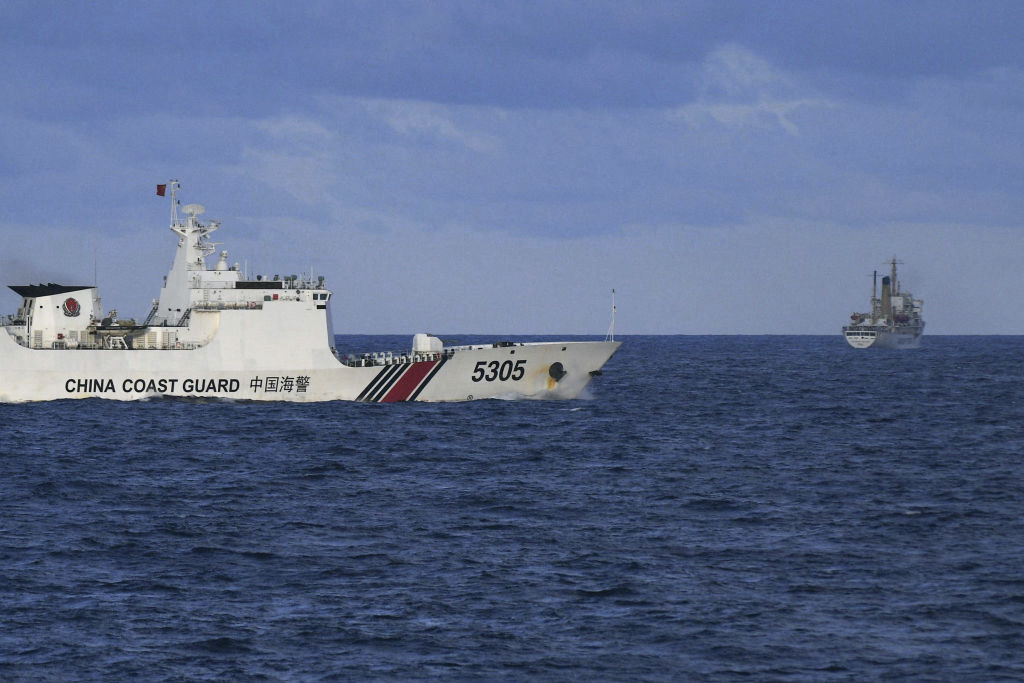by Lawrence A. Franklin
It is clear that Xi is doubling down on his claim of sovereignty over almost all of the South China Sea, starting with Taiwan, and understands that he might have only a few "good" months left.
Despite the allegedly warm atmosphere of the San Francisco Summit between China's Communist Party leader Xi Jinping and US President Joseph Biden, the Chinese dictator reportedly told Biden, "that Beijing will reunify Taiwan with mainland China but that the timing has not yet been decided," and "that China's preference is to take Taiwan peacefully, not by force."
It is clear that Xi is doubling down on his claim of sovereignty over almost all of the South China Sea, starting with Taiwan, and understands that he might have only a few "good" months left.

American and Chinese military leaders have communicated by video link on December 21, after a hiatus of more than a year. Hopefully, Chairman of the Joint Chiefs of Staff General Charles Brown took the opportunity to raise the issue of China's bullying of Philippine vessels in the South China Sea with his Chinese counterpart, General Li Shang-fu.
The latest aggressive move by the Chinese Communist Party (CCP) took place when a Chinese Coast Guard ship deluged three Philippine vessels with water cannon on December 9 and 10. This assault resulted in severe engine damage to one of the Philippine vessels necessitating it to be towed to home port.
Another vessel found itself rammed by a Chinese boat. That incident took place near the Second Thomas Shoal, an island in waters also claimed by China. CCP bullying in 2023 also included threatening maneuvers by Chinese ships against Philippine maritime exploration for hydrocarbons and natural gas, as well as frequent harassment of Filipino fishermen. In a more serious encounter in February 2023, a Chinese patrol boat lasered Filipino sailors. China's maritime aggression against Philippine efforts to resupply a military contingent on a marooned vessel on an island in disputed waters of what Manila calls the West Philippine Sea.
China's repeated targeting of the Philippines appears possibly related to Manila's decision to grant the US expanded military presence in the Philippines, by granting the US military access to four additional air and naval facilities, raising the number to nine. The newly installed Philippine President Ferdinand Marcos Jr. reversed his predecessor's policy: appeasing China.
These additional US facilities will house pre-positioned military equipment, fuel storage and housing for American troops. The bases include Lal-lo Airport and Camilo Osias Naval Base in Cagayan Province and Camp Melchor in Isabella Province. For sure, it is not lost on the Chinese Communist regime that these three new US bases are close to Taiwan. The fourth base is on Palawan Island, near Philippine's Exclusive Economic Zone (EEZ), which according to the United Nations, is 200 nautical miles off the coasts of nation states.
The Chinese game plan seems crafted to test the resolve of the US commitment to defend Philippine sovereignty. If the US appears to be unwilling to risk a clash with China over its repeated intrusions into the waters of the Philippines' EEZ, the CCP will exploit any appeasement by the Biden administration to weaken confidence of other American Pacific-based allies, thereby shredding the integrity of any Indo-Pacific Alliance of democracies to contain China.
Chinese President Xi Jinping is probably testing the vitality of the US pledge to defend Philippine interests in light of similar Biden administration promises to defend Taiwan. A failure of the US political and military leaders to mount a robust defense of Philippine sovereignty will doubtless increase the likelihood of a Chinese decision to invade or blockade Taiwan.
The US should immediately deploy armed escorts to accompany Philippine vessels the next time our ally needs to resupply Filipino Marines in waters claimed by China.
Despite Communist Chinese media ridiculing the President Marcos's decision to challenge China's exorbitant claims to roughly 85% of the South China Sea, the Philippine president took the significant step of seeking an alliance with its World War II enemy Japan for an expanded defense treaty during his December 16-18 visit to Tokyo. Reportedly, Marcos is also asking France to increase defense ties.
China appears equally determined to continue this game of "chicken" on the high seas. China's aggressive moves against Philippine sovereignty will continue despite the 2016 decision by the UN's Permanent Court of Arbitration that the disputed waters are clearly in the Philippines' EEZ. No one has so far been killed, but if Beijing escalates by, say, more forcefully ramming or attempting to board a Philippine boat, casualties are likely.
"If the Chinese attempt to board our vessels," the head of Philippines Western Command Alberto Carlos declared, "that is not something that we will allow them to do."
Manila might initiate a diplomatic maneuver by hosting other regional states -- such as Vietnam, Brunei, Malaysia, Indonesia and Taiwan -- which have conflicting claims with China in the South China Sea. Such an action might have the effect of diplomatically swaying China to temporarily tone down its belligerency.
Despite the allegedly warm atmosphere of the San Francisco Summit between China's President Xi Jinping and US President Joe Biden, the Chinese dictator reportedly told Biden, "that Beijing will reunify Taiwan with mainland China but that the timing has not yet been decided," and "that China's preference is to take Taiwan peacefully, not by force."
It is clear that Xi is doubling down on his claim of sovereignty over almost all of the South China Sea, starting with Taiwan, and understands that he might have only a few "good" months left.
Dr. Lawrence A. Franklin was the Iran Desk Officer for
Secretary of Defense Rumsfeld. He also served on active duty with the
U.S. Army and as a Colonel in the Air Force Reserve.
Source: https://www.gatestoneinstitute.org/20259/china-bullying-philippines
No comments:
Post a Comment